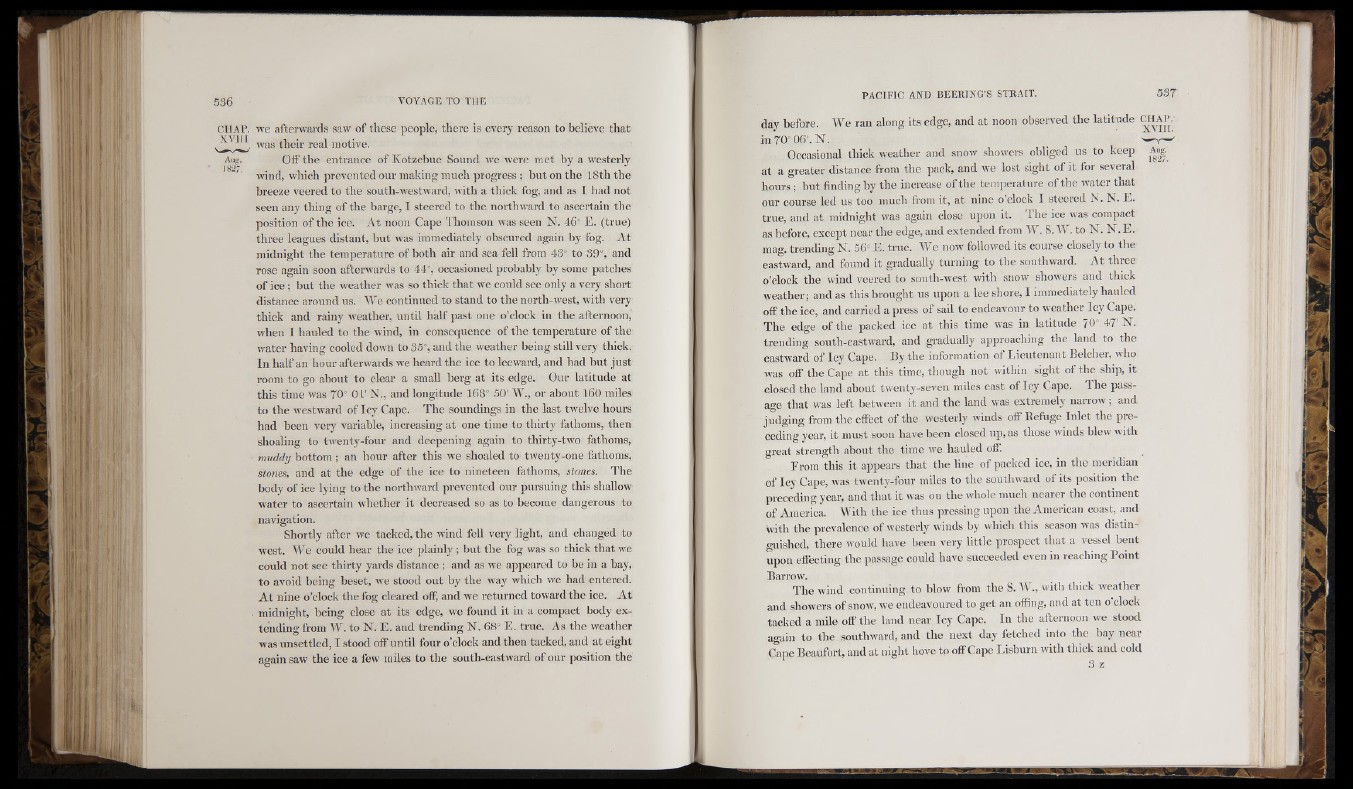
’ il.
Nlj
r i
CHAP. we afterwards saw of these people, there is every reason to believe that
was their real motive.
Aug. Off the entrance of Kotzebue Sound we were met by a ivesterly
wind, which prevented our making much progress ; but on the 18th the
breeze veered to the south-westward, with a thick fog, and as I had not
seen any thing of the barge, I steered to the northward to ascertain the
position of the ice. At noon Cape Thomson was seen N. 46" E. (true)
three leagues distant, but was immediately obscured again by fog. At
midnight the temperature of both air and sea fell from 43° to 39°, and
rose again soon afterwards to 44", occasioned probably by some patches
of ic e ; hut the w'eather was so thick that we could see only a very short
distance around us. We continued to stand to the north-w'est, with very
thick and rainy weather, until half past one o’clock in the afternoon,
when I hauled to the wind, in consequence of the temperature of the
water having cooled down to 35°, and the w'eather being still very thick.
In half an hour afterwards we heard the ice to leew'ard, and had but just
room to go about to clear a small berg at its edge. Our latitude at
this time was 70" 0 1' N., and longitude 168° 50' W., or about 160 miles
to the westw'ard of Icy Cape. The soundings in the last twelve hours
had been very variable, increasing at one time to thirty fathoms, then
shoaling to twenty-four and deepening again to thirty-two fathoms,
muddy bottom; an hour after this we shoaled to twenty-one fathoms,
stones, and at the edge of the ice to nineteen fathoms, stones. The
body of ice lying to the northward prevented our pursuing this shallow
water to ascertain whether it decreased so as to become dangerous to
navigation.
Shortly after we tacked, the wind fell very light, and changed to
west. We could hear the ice plainly ; hut the fog was so thick that we
could not see thirty yards distance ; and as we appeared to be in a bay,
to avoid being beset, we stood out by the way which we had entered.
At nine o’clock the fog cleared off, and we returned toward the ice. At
. midnight, being close at its edge, we found it in a compact body extending
from W. to N. E. and trending N. 68° E. true. As the weather
was unsettled, I stood off’ until four o’clock and then tacked, and at eight
again saw the ice a few miles to the south-eastward of our position the
day before. We ran along its edge, and at noon observed the latitude
in 70° 06'. N . '— e—
Occasional thick weather and snow showers obliged us to keep xng.
at a greater distance from the pack, and we lost sight of it for several
hours; but finding by the increase of the temperature ofthe water that
our course led us too much from it, at nine o'clock I steered N. N. E.
true, and at midnight was again close upon it. 'f he ice was compact
as before, except near the edge, and extended from IV. S. W. to N . N . E.
mag. trending N. 56" E. true. We now followed its course closely to the
eastward, and found it gradually turning to the southward. At three
o’clock the wind veered to south-west with snow showers and thick
weather; and as this brought us upon a lee shore, I immediately hauled
off the ice, and carried a press of sail to endeavour to weather ley Cape.
The edge o fth e packed ice at this time was in latitude 70" 4 7 'N.
trending south-eastward, and gradually approaching the land to the
eastward of Icy Cape. By the information of Lieutenant Belcher, who
was off the Cape at this time, tliough not within sight of the ship, it
closed the land about twenty-seven miles east of Icy Cape. The passage
that was left between it and the land was extremely narrow; and
judging from the effect of the westerly winds off Refuge Inlet the preceding
year, it must soon have been closed up, as those winds blew with
great strength about the time we hauled off.
From this it appears that the line of packed ice, in the meridian
of Icy Cape, was twenty-four miles to the southward of its position the
preceding year, and that it was on the whole much nearer the continent
of America. "With the ice thus pressing upon the American coast, and
with the prevalence of westerly winds by which this season ivas distinguished,
there would have been very little prospect that a vessel bent
upon effecting the passage could have succeeded even in reaching Point
Barrow.
The wind continuing to blow from the S. W., with thick weather
and showers of snow, we endeavoured to get an offing, and at ten o’clock
tacked a mile offthe land near Icy Cape. In the afternoon we stood
again to the southward, and the next day fetched into the bay near
Gipe Beaufort, and at night hove to off Cape Lisburn with thick and cold
3 z